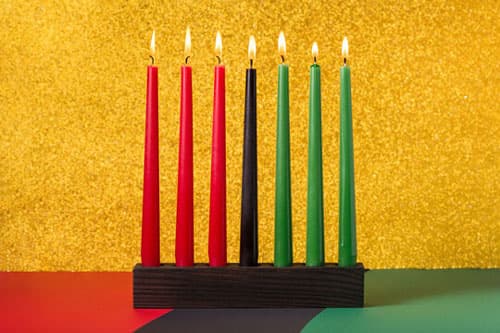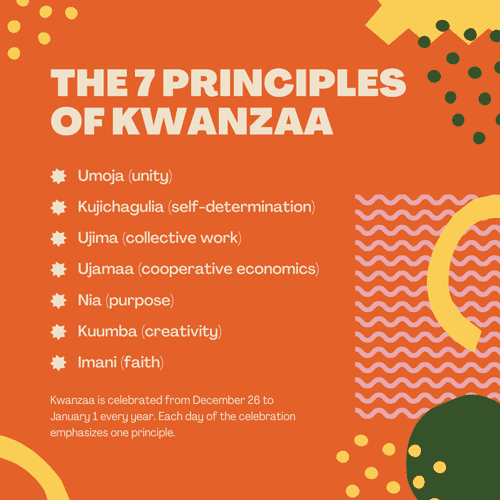Today, Kwanzaa begins! For seven days every year, millions of Americans celebrate Kwanzaa, an African American and Pan-African holiday honoring family, community, and culture. The non-religious holiday is observed from December 26 to January 1, and is based on seven principles called the Nguzo Saba.
The name Kwanzaa comes from the Swahili phrase, “matunda ya kwanza,” meaning "first fruits." It's based on African harvest festivals, which include lots of dancing and music.
Each night, those celebrating Kwanzaa light a candle, held by a kinara, to represent each principle. The kinara holds seven candles, including one black candle (symbolizing the African people), three red candles (representing their struggle), and three green candles (for future possibilities).

These colors pay homage to the Pan-African flag created by Marcus Garvey, a civil rights activist who led the Pan-Africanism movement. The black candle is lit first, then a red candle, then a green candle, alternating between the remaining candles each day until all seven have been ignited. Families discuss the principle of the day while lighting the respective candle.
On December 31, the sixth day of Kwanzaa, people participate in a feast called Karamu. Celebrators may give gifts, mostly handmade, to promote self-determination, purpose, and creativity. The final day focuses on looking to the future and giving homemade gifts.

Here are the seven principles of Kwanzaa in the order they are followed, along with their representative meanings:
Umoja (unity): "To strive for and maintain unity in the family, community, nation, and race."
Kujichagulia (self-determination): "To define ourselves, name ourselves, create for ourselves, and speak for ourselves."
Ujima (collective work and responsibility): "To build and maintain our community together and make our brother's and sister's problems our problems and to solve them together."
Ujamaa (cooperative economics): "To build and maintain our own stores, shops, and other businesses and to profit from them together."
Nia (purpose): "To make our collective vocation the building and development of our community in order to restore our people to their traditional greatness."
Kuumba (creativity): "To always do as much as we can, in the way we can, in order to leave our community more beautiful and beneficial than we inherited it."
Imani (faith): "To believe with all our heart in our people, our parents, our teachers, our leaders, and the righteousness and victory of our struggle."

Happy Kwanzaa to those who celebrate!





Leave a Comment